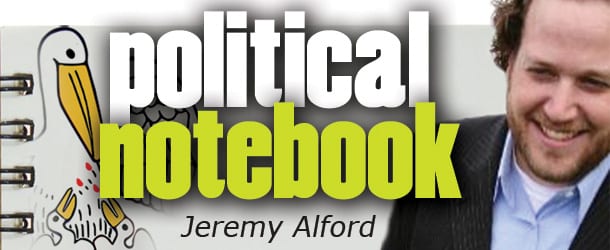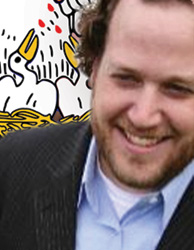By Jeremy Alford and Mitch Rabalais
Although they don’t always end up being debated inside Louisiana’s Capitol building, issues that capture the attention of hunters and anglers are constantly under review in ways both big and small, according to the chairman of the House Natural Resources Committee.
State Rep. Stuart Bishop, R-Lafayette, said in a recent interview that many of the proposals for the regular session that convenes on March 12 are still being drafted and researched. But he touched on a number of issues, ranging from deer and fish populations to feral hogs, that are creating a buzz on social media and at hunting and fishing camps across the state.
The House Natural Resources Committee oversees not only the Department of Wildlife and Fisheries and the activities it regulates, but also all legislative matters pertaining to mining, energy and public lands.
Hunting and fishing issues, however, routinely produce some of the most emotional exchanges between lawmakers and residents of the so-called “Sportsman’s Paradise,” he said.
One issue that seems to be trending on Facebook and similar platforms is the question of whether hunters should take partial blame for declining deer populations. In particular, there’s the suggestion that too many does, or female deer, are being harvested.
“It’s quite possible,” said Bishop, when he was asked if doe numbers might become the focus of upcoming legislation. “I’d like to see more people take a look at the Quality Deer Management Program, as well as get involved with the biologists at (the Department of) Wildlife and Fisheries to see what is exactly right.”
Bishop, a second-term legislator, is entering his third year as natural resources chairman, and he’ll soon get the chance to revisit one of his own policy milestones from 2014. That was when the Legislature and former Gov. Bobby Jindal endorsed Bishop’s plan for funding an initiative to allow the state to collect its own recreational fishing data.
It took considerable time and effort, but the federal government finally approved the LA Creel survey program in early January. As a result, the survey program funded by Bishop’s enabling legislation can now officially replace the federal Marine Recreational Information Program in state waters.
Federal fish counts have been under heavy scrutiny by Louisiana interests in recent years, especially when it comes to red snapper populations. Congressman Garret Graves, R-Baton Rouge, said recently that LA Creel could lead to more fishing opportunities for Bayou State anglers. “This is absolutely a huge win for the fishermen of Louisiana,” Bishop said, adding, “We’re going to extend (the funding for LA Creel) for another four years.”
That renewal bill should surface soon — in time for the regular session and before the May 31 expiration date of Bishop’s enabling legislation from 2014. That measure added a fee of $7.50 for residents purchasing a saltwater license. It dedicated that money to the Saltwater Fish Research and Conservation Fund, which underwrites LA Creel.
Invasive feral hogs have become another perennial issue for the House Natural Resources Committee, said Bishop, and there’s a growing focus on the use of toxic baits, like Kaput. Interested parties are trying to weigh the risks of such poisons against the success they have in slowing destruction caused by feral hogs.
It’s a serious matter, the chairman said, with 700,000 wild swine roaming around in every Louisiana parish. The LSU AgCenter found that the hogs were the source of $55 million in agricultural damages in 2014 and 2015.
“We need to look at what other states are doing with the non-transport of feral hogs and we need to look at Kaput and if it’s absolutely the right toxicant for it,” said Bishop, referring to research that involves the Departments of Agriculture and Wildlife, both of which are exploring a variety of different avenues.
“We need to make sure there aren’t any by-products and there aren’t any other animals eating the toxicants that we’re putting out for the hogs.”
Edwards’ Budget Numbers Questioned
After months of meetings that failed to yield compromises and threats of a gut-wrenching string of legislative sessions, Gov. John Bel Edwards has finally shared with lawmakers his top policy priorities and a doomsday budget proposal.
But some lawmakers who were involved with the big reveal during a meeting of the Joint Legislative Committee on the Budget were unsure about the numbers.
From how much money revenue proposals would bring in for the state to the size of the deficit the Legislature and administration must address, there were more than a few disagreements.
By law, Edwards had to present a budget to lawmakers, which meant he had to account for more than $1 billion in temporary tax revenue falling off the books at the start of the next fiscal year on June 1.
Severe reductions to health care services and the TOPS scholarship program were a part of that rocky outlook, as were cuts to sheriffs, district attorneys, state parks, judges and other government stakeholders.
“This is what falling off the cliff looks like,” Edwards told the committee, adding it’s not the budget he wanted. But if lawmakers can rally around some of his revenue-generating proposals, the budget picture would improve, the governor said.
Rep. Lance Harris, R-Alexandria, the chairman of the House Republican Delegation, doubted that assessment, especially since the governor’s plan no longer calls for changes to personal income tax brackets.
Without that hefty tax alteration in the governor’s plan, Harris said the administration’s overall proposal for the 2018-19 fiscal year still falls short by $300-400 million.
Acknowledging as much, Revenue Secretary Kim Robinson said later, “We have a little more work to do.”
There’s also some uncertainty about how much of a boost the state would receive due to the tax changes implemented by Congress and President Donald Trump. The governor said the state does stand to benefit from those changes, but he stopped short of placing a price tag on the new federal laws.
House Appropriations Chairman Cameron Henry, R-Metairie, asked the administration for a financial analysis, or fiscal note, for each of its proposals. The governor countered that all of his proposals have been debated by the Legislature already over the past two years and those fiscal notes are readily available for review.
Many lawmakers, however, believe fiscal notes could play a critical part in coming negotiations, as Capitol players try to find common ground on how much money is needed and how much revenue would be generated by various proposals.
They Said It
“I don’t believe we need more gun control. We need more idiot control.”
— U.S. Sen. John Kennedy, on CNN
“I think my wife would leave me if I ever retired. Not because of the income. Because I don’t think she could spend that much time with me.”
— Congressman Garret Graves,
on Facebook Live
“The only people who are complaining about a town hall are the whack jobs who want to get on television.”
— U.S. Sen. John Kennedy, to a reporter who asked about his town hall schedule, on a conference call
For more Louisiana political news, visit www.LaPolitics.com or follow Jeremy Alford on Twitter @LaPoliticsNow.














Comments are closed.